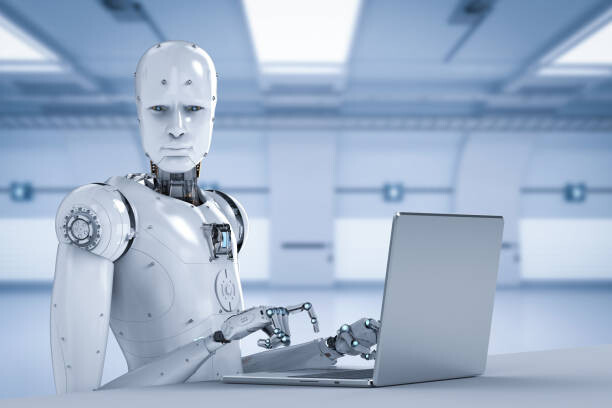With the advancement in science and technology, the use of Artificial Intelligence (AI) has become more prevalent in various industries. AI is being used to automate repetitive tasks, to solve complex problems and to find solutions to some of the most challenging issues. It is also being used as an assistant for human beings, who are not able to do a task as efficiently as AI can.
Robotic Process Automation (RPA) is another form of AI that has been gaining popularity in recent years. RPA is a technology that automates repetitive tasks by mimicking humans through software agents or bots. These bots are programmed with rules or instructions on how they should behave when certain conditions are met and then carry out these instructions without any human intervention. This automation process eliminates errors caused by human error and provides consistency
Clavis Technologies provides custom RPA development services. Clavis Technologies has more than 10 years of experience in software development and offers a wide range of solutions for business automation, including custom RPA development services.
Automate parts of your business – and hire the right developers to do it – with Robotic Process Automation. You can also opt in for AI writers, which can help you get a lot done without having to put in as much effort.
We have a wealth of experience in UiPath, Automation Anywhere, or BluePrism or when it comes to creating a custom RPA layout. We can help you automate all sorts of tasks—from content extraction to data population and aggregation as well as any transactional operations.
What can Clavis do for you?
Intelligent Content Extraction
AI is being used to create new technologies that make content extraction easier. Intelligent content extraction technology enables computers to automatically extract content from a source. AI is used so the system understands what the text means and generates a clean, structured data repository for you.
Data Gathering and Aggregation
Sophisticated data gathering, aggregation and automation for collecting, refining and consolidating disparate sources of data at web speed. This can be then used to produce insights and analytics on big data or recommend items that you might find interesting.
Faster Transactional Operations
Smarter transactional processes are the cornerstone to a successful customer experience strategy. We help develop RPA solutions which automate the workflows that drive your company, be it financial services, healthcare, insurance and other industries, to success.
With increased competition in the marketplace, it’s more important than ever to optimize your customer experience strategy. RPA provides a scalable solution to automate transactional processes and streamline workflows, helping you improve productivity and customer satisfaction.
Web Scraping
Our crawlers are powered by our AI and can scrape data from a huge number of sources. We provide you with a custom option that targets your specifications, leaving you to worry about other things. With our scraping pipeline and customized post-processing, we can help you export data to your infrastructure. Plus, we are able to scrape not just webpages but anything that has a URL.
Optimised Healthcare Processes
We help businesses find the workflow they need and create a seamless experience between them, while also creating programs to build their business like an appointment booking system, consulting room and more. Using AI to streamline repetitive tasks and make the patient experience better is a great idea. They reduce the burden of paperwork for doctors and other medical professionals too.
Automated Claim Processing
Build workflows that pre-define the process for capturing claims from multiple channels like web forms, email, and SMS. This will allow you to make sure the content is formatted in a way that makes sense for your claim software. This data can be automatically pushed for settlement adjustment, fraud detection, and review. Once final validation is confirmed, payment triggers allow the transaction to be processed.
Why Clavis is the right RPA Development provider/consultant for you?
Intelligent Automation Design
We help to design and implement intelligent automated workflows. We have a lot of experience in creating digital interaction management solutions and delivering innovative business processes. Our consultants can help you do the same both seamlessly & efficiently.
RPA Consultancy
Our consultation service will help you automate office processes with the latest RPA tech. It can help streamline your workflow and lower production costs, which will in turn lead to better service quality! We offer a range of solutions, from chatbots and robotics automation to in-person human assistants. Whatever you need, we’re here to help.
Offsite RPA Developers
We’re proud to have an experienced RPA development team who are experts on platforms like UiPath, Automation Anywhere and Blue Prism. Our engineers support customers of all sizes, with a diverse range of needs.
Bot Development and Support
Our development tools will help make the process of creating useful bots more enjoyable and easier. Find out how our simple tools can save you time and allow you to plan your development from the ground up or choose from a number of predefined templates.
The Future of Process Automation with Clavis
Clavis helps business owners and big enterprises in developing an Intelligent Robotic Process Automation software that is designed to make the process of automating repetitive tasks and business processes much easier. The future of automation will be very different from what we know today. Clavis is a company that has been able to identify the need for this change and has created a solution for the future.
ERP vs CRM: Key Differences, Strengths, and How Clavis’ ERP Drives Organizational Success
In the digital age, businesses strive to leverage advanced tools to streamline operations, boost productivity, and foster better customer relationships. Two pivotal software solutions that play a significant role in achieving these goals are Enterprise Resource Planning (ERP) and Customer Relationship Management (CRM) systems. While these tools may seem similar at first glance, they serve distinct purposes and offer unique benefits, and it is important to understand why you may need one or the other—or both in tandem.
1. What is ERP?
ERP stands for Enterprise Resource Planning, a comprehensive software suite that manages and integrates core business processes. These processes often include:
- Finance and accounting
- Human resources
- Supply chain management
- Inventory and order management
- Manufacturing
ERP systems centralise business data, allowing various departments to collaborate seamlessly and make informed decisions based on real-time insights.
Core Features of ERP Systems
- Centralized Data Management: Consolidates information from all business departments into one platform.
- Process Automation: Automates repetitive tasks to improve efficiency.
- Scalability: Can grow with your business, accommodating new functionalities as needed.
- Compliance Support: Helps organisations meet regulatory requirements.
- Advanced Analytics: Provides detailed insights to support strategic decision-making.
2. What is CRM?
CRM, or Customer Relationship Management, is software that focuses on managing a company's interactions with current and potential customers. The primary goal of a CRM system is to improve customer satisfaction, retention, and acquisition through personalised communication and efficient management of sales and marketing activities.
Core Features of CRM Systems
- Contact Management: Maintains detailed records of customer interactions and preferences.
- Sales Pipeline Tracking: Manages leads and monitors the sales process.
- Marketing Automation: Facilitates email campaigns, social media management, and more.
- Customer Support: Enhances post-sale services through ticketing systems and live chats.
- Data-Driven Insights: Helps identify trends to fine-tune marketing and sales strategies.
3. ERP vs. CRM: Key Differences
While ERP and CRM are essential for business success, they cater to different aspects of operations.
|
Feature |
ERP |
CRM |
|
Primary Focus |
Internal processes and operational efficiency |
Customer interactions and relationships |
|
Key Functions |
Accounting, supply chain, HR, inventory |
Sales, marketing, customer service |
|
Target Audience |
Internal stakeholders |
Sales, marketing, and customer support teams |
|
Data Integration |
Focuses on consolidating operational data |
Specialises in customer-centric data |
|
Scalability |
Enterprise-wide |
Primarily focused on customer management |
4. The Strengths of ERP Systems
ERP systems are the backbone of operational efficiency. Their key strengths include:
- Holistic Business View: ERP provides a comprehensive view of business operations by integrating data across departments.
- Cost Reduction: Automating processes reduces manual labour and errors, saving time and money.
- Improved Compliance: Centralized data simplifies regulatory reporting and ensures adherence to standards.
- Inventory Optimization: Enhances inventory management, reducing waste and ensuring timely procurement.
- Agile Decision-Making: Real-time data insights help leaders make swift, informed decisions.
5. The Strengths of CRM Systems
CRM systems shine in the realm of customer relationship management, with benefits such as:
- Enhanced Customer Insights: Tracks and analyses customer preferences to tailor interactions.
- Improved Customer Retention: Personalization and timely communication foster loyalty.
- Streamlined Sales Processes: Automates lead management, reducing manual intervention.
- Marketing Optimization: Helps segment audiences for targeted campaigns.
- Boosted Collaboration: Facilitates alignment between sales and marketing teams.
6. ERP and CRM: Complementary Tools
Though distinct, ERP and CRM systems are complementary and often integrated to deliver maximum value. For instance:
- CRM manages the front-end relationship with customers, while ERP handles back-end processes like inventory and order fulfilment.
- Together, they provide a seamless flow of information, ensuring that customer-facing teams have accurate, up-to-date data on orders and services.
7. Clavis' ERP: The Ultimate Solution for Organizational Success
Clavis' ERP stands out as a robust ERP solution designed to address the multifaceted needs of modern businesses. Here’s how it can drive your organisation's success:
a) Comprehensive Integration
Clavis' ERP integrates seamlessly with existing systems, including CRM platforms, to unify your business processes.
b) Real-Time Data Analytics
With Clavis' ERP, decision-makers can access advanced analytics tools that offer actionable insights into performance, trends, and potential opportunities.
c) Tailored Functionality
Highly customisable to suit the unique needs of businesses across industries, Clavis' ERP works for all—from manufacturing to retail and more.
d) Enhanced User Experience
The platform boasts an intuitive interface, making it easy for employees to adopt and use effectively.
e) Cloud Capabilities
Leverage cloud-based deployment for flexibility, scalability, and cost savings.
9. Choosing the Right Solution for Your Business
When deciding between ERP and CRM—or opting for an integrated approach—consider the following:
- Business Goals: Identify whether your primary focus is operational efficiency (ERP) or customer relationships (CRM).
- Scalability: Choose a solution that can grow with your business.
- Budget: Evaluate the total cost of ownership, including deployment and maintenance.
- Customization: Ensure the platform can be tailored to your specific needs.
Final Thoughts
ERP and CRM systems are indispensable for businesses aiming to optimise operations and enhance customer relationships. While they serve distinct purposes, their integration offers unparalleled value. With Clavis' ERP, you gain a robust tool that streamlines your operations and integrates seamlessly with CRM systems to provide a holistic business solution.
Some other posts you might be interested in.

Mauritius and MNIC 3.0 – Driving the Digital Transformation in East Africa
On February 26, 2024, the Prime Minister of Mauritius, Mr Pravind Kumar Jugnauth, unveiled MNIC 3.0, the latest iteration of the Mauritius National Identity card. Speaking on the occasion, the Prime Minister stated, “The new card reflects our commitment to modernity,...

CMS and DAM: Why your business needs both
With the enhancement of technology, consumers require flawless experiences in everything they do. Be it at home, with their smartphone, car, or work-space, the ease of handling tasks should be at the snap of a finger. To have a seamless experience at the workspace,...

15 Applications of Blockchain in Healthcare
"Blockchain" refers to a shared irreversible record of a chain of transactions, each of which is made up of one block, and which is held together by cryptographic keys ("hashes"). These keys or signatures are maintained in shared ledgers and connected by a network of...
